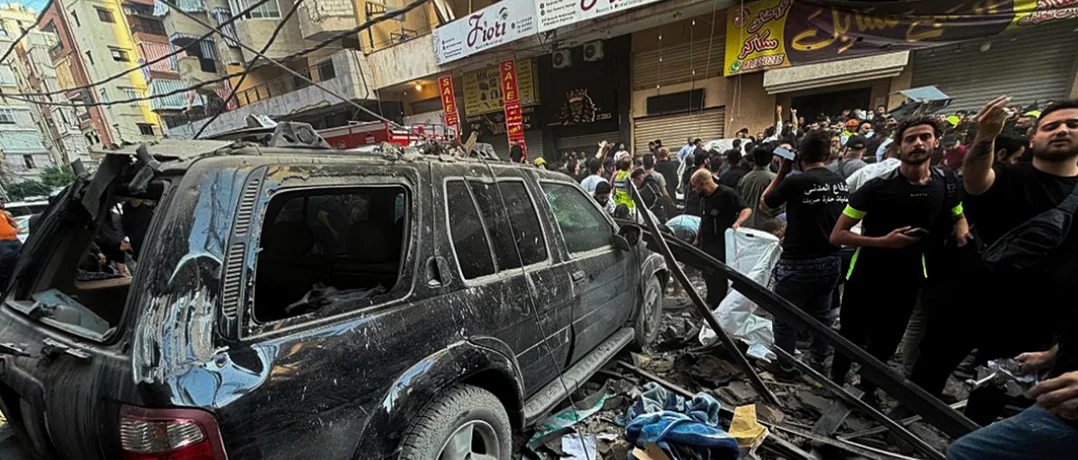The assassination of Hezbollah's Haytham Tabtabai escalates tensions, leaving Lebanon caught between retaliation and diplomacy.
What comes after Israel’s Dahieh strike?

On 23 November 2025, the Israel Defense Forces (IDF) targeted the southern suburb of Beirut (Dahieh) for the first time since June. Its intended goal was the assassination of Hezbollah’s chief of staff, Haytham Tabtabai.
This dangerous escalation raises serious concerns and questions regarding potential scenarios lying ahead.
Who was Haytham Tabtabai?
Haytham Ali Tabtabai (also known as Sayyed Abou Ali) was not a widely known figure in Lebanon until Israel’s strike on 23 November 2025, as he became the highest-ranking figure in Hezbollah to be assassinated following the November 2024 cessation of hostilities between Lebanon and Israel.
Tabtabai was a senior military commander in Hezbollah, taking part in various critical field operations, including leading the Nabatieh axis (1996-2000), the Khiam axis (2000-2008), commanding during the July 2006 war and both the Syrian and Yemeni conflicts, as well as participating in establishing the group’s elite Radwan Force.
Where is Lebanon heading?
The recent Israeli strike, coupled with recent escalatory Israeli operations and rhetoric, could see peace in the country falter. Instead of bringing de-escalation and stability to Lebanon and the Middle East, many analysts now believe that the potential renewal of war has now become imminent.
Furthermore, Lebanese President General Joseph Aoun’s call for negotiations with Israel (backed by Prime Minister Nawaf Salam as well) seems to fall on deaf ears. Israel believes that no such negotiations can take place before the full disarmament of Hezbollah, while also stressing on conducting them in a direct method. Nevertheless, Lebanese authorities persisted with their calls for the international community to intervene and stop Israeli aggression.
What are Hezbollah’s choices?
The Islamic Revolutionary Guard Corps (IRGC) condemned, in an official statement, the killing of Tabtabai, warning that “the right of the Resistance Axis and Lebanese Hezbollah to avenge the blood of the fighters is preserved, and the terrorist aggressor will be met with an overwhelming response at the determined time.’ However, Hezbollah refrained from going as far as to issue threats of retaliation.
Indeed, the group’s military and political status face a serious predicament, given growing domestic and foreign pressure for its disarmament and reducing its influence in Lebanon and abroad. Additionally, hidden resentment and whispers have circulated among the people and even within Hezbollah’s environment about the presence of senior security officials in densely populated residential neighborhoods, considering that protecting civilians has become a necessity in light of Israel’s disregard for any international legal norms and regulations.
From here, Hezbollah is left with two bitter options:
- Retaliation: The group could opt for vengeance and launch retaliatory strikes on Israel. However, the risks and losses outweigh the benefits. It would risk an all-out war with Israel, which the latter seems to be longing for, encompassing not only Hezbollah-held areas, but other vital Lebanese areas, infrastructure and sectors. Such a scenario would enhance Lebanese opposition to the group, blaming its insistence on retaining arms and launching attacks on Israel without referring to the legitimate government. This asymmetric war would also most likely see utter destruction and possibly the demise of Hezbollah’s military wing, given the IDF’s technological and military superiority.
- Remaining Silent: The group could refrain from responding, however, with possible internal and external consequences. Its environment and supporters could view such silence as a sign of weakness and impotence. On the other hand, failing to retaliate would only embolden Israel to not only persist in its violations and assassinations, but rather exacerbate them as well.
An imminent war ahead?
With Hezbollah’s insistence on retaining its arms (at least until Israeli withdrawal from the occupied Lebanese posts) and Tel Aviv’s insistence on disarming the group entirely before withdrawing, Lebanon seems to be left to suffer from this never-ending conflict.
Despite this gloomy image, the Lebanese state must continue to pursue diplomacy to halt Israeli violations, while simultaneously take bolder steps and actions (not mere vocal statements and positions) to ensure the disarmament of Hezbollah (both south and north of the Litani River). It should not stand idle in the face of persistent refusal to join the state in a legal and equal manner under the pretext of “securing national unity and preventing civil war.” What the past conflict and evolving dynamics have revealed is that it is the retaining of illegal armament that has posed a risk to the lives and prosperity of the Lebanese, not the opposite way around.



